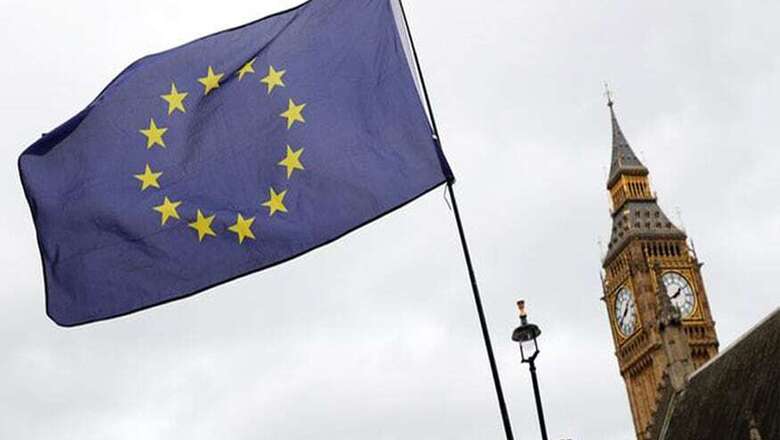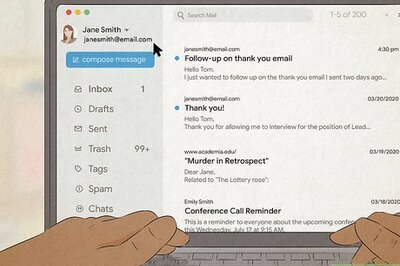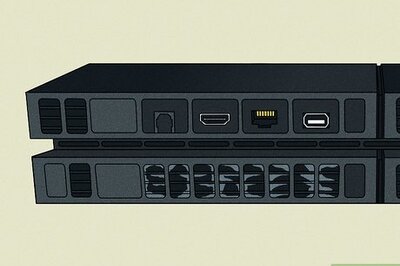
views
BRUSSELS: The European Union on Wednesday laid out how it expected to regulate Northern Ireland's trade if no better solution was found in the rapidly shrinking window before Britain quits the EU, prompting furious reactions in London and Belfast.
Brussels' chief negotiator Michel Barnier, presenting the EU's draft of an exit treaty, denied that the proposal, intended to avoid a disruptive EU-UK "hard border" on the island of Ireland, would loosen Northern Ireland's constitutional ties to the rest of the United Kingdom.
But British leader Theresa May told her parliament that no prime minister could ever agree to these terms, which would "threaten the constitutional integrity of the UK".
The hardline Unionist allies in Belfast on whom she relies for a slim majority denounced them as "constitutionally unacceptable" and "economically catastrophic" as they would distance Northern Ireland from mainland Britain.
Establishing a "common regulatory area" with Ireland and 26 other EU states, as the draft treaty proposes, would in effect put the British province in a customs union with the bloc.
"Northern Ireland shall be considered to be part of the customs territory of the Union," the draft read. Barnier said Britons should not be surprised by a text that merely translated an interim accord with London into legal language.
And he said the border proposal was only a "backstop" solution, which could be changed if Britain offered alternatives along the lines of those it hinted at during talks in December.
N.IRELAND PEACE SETTLEMENT
Britain's vote to leave the EU has undermined one of the pillars of a 1998 settlement that ended decades of violence in Northern Ireland between mostly Catholic Irish nationalists and Protestant unionists favouring continued union with Britain.
In Dublin, Foreign Minister Simon Coveney echoed Barnier, saying the draft was "absolutely faithful" to the December accord and "should not be a surprise to anybody".
Barnier rammed home that "time is short" before Britain will be out of the EU in exactly 13 months. He called on May to "pick up the pace" of negotiations so that a withdrawal treaty, including terms for keeping the status quo during a two-year transition, could be agreed this autumn and ratified by March.
As the rhetoric on both sides has taken a more irritable turn, and negotiations have stalled since the interim accords in December, Barnier said he was "preparing for every situation" in case the continent’s second-biggest economy lurches out of the Union without a deal after 46 years.
May, who will lay out her vision for a future trading relationship with the EU on Friday and deliver a full response to the withdrawal draft on Monday, said she would work to protect UK unity in the negotiations. She again ruled out an EU-UK customs union -- something that her Labour opponents advocate as a way to avoid disruptive controls at the Irish land border.
"Overall the work has been progressing well in recent weeks," her spokesman said. "This is just a draft document ... and we will be having discussions where we don't agree in the coming months."
Unionists fear new barriers with the British mainland could increase the chances of the Republic, which broke from British rule a century ago, absorbing the province, most of whose 1.8 million people are entitled to Irish, and hence EU, citizenship.
Barnier conceded there might be new checks on trade between Northern Ireland and the mainland -- but definitely no "border".
"NO ARROGANCE HERE"
The Democratic Unionist Party's Nigel Dodds, however, said his "ludicrous" plan "will not go anywhere".
Barnier dismissed suggestions that the draft was an attempt to "shock" Britons into concluding a deal, insisting that his sole goal was to avoid a disorderly divorce. "There is no arrogance here," he said.
The draft treaty sees a joint EU-UK committee overseeing the arrangements but the European Court of Justice remaining the ultimate authority to resolve disputes.
Asked why the draft made no mention of a section in December's EU-UK joint report that there should be no regulatory divergence between Great Britain and Northern Ireland, Barnier said it was because that was an internal UK matter.
He restated his view that the proposals for future trade that May is expected to make on Friday - to maintain a mixture of common and different regulations with the EU - were not acceptable. "There will be no cherry-picking," he said.
Barnier said he would engage in a new round of negotiations next week and would also meet leaders of Northern Ireland.
He also said "significant divergences" remained in talks on a transition period, and so a deal, which both sides hope to clinch in March to calm business nerves, was "not a given".
Supporters of Brexit argue that Britain will benefit from no longer being bound by EU rules and can do more trade with the rest of the world, while opponents say the prospect of new barriers to trade in Europe is already hurting its economy.
May's government got a boost on Wednesday when Japanese carmaker Toyota confirmed plans to build a new model in England.
















Comments
0 comment